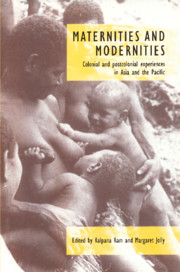Book contents
- Frontmatter
- Contents
- List of illustrations
- Notes on contributor
- Acknowledgements
- Map 1 Location of countries and regions in Asia and the Pacific discussed in this volume
- Introduction Colonial and postcolonial plots in histories of maternities and modernities
- 1 Shaping reproduction: maternity in early twentieth-century Malaya
- 2 Modernizing the Malay mother
- 3 ‘Good wives and mothers’ or ‘dedicated workers’? Contradictions of domesticity in the ‘mission of sisterhood’, Travancore, south India
- 4 Maternity and the story of enlightenment in the colonies: Tamil coastal women, south India
- 5 The dai and the doctor: discourses on women's reproductive health in rural Bangladesh
- 6 Other mothers: maternal ‘insouciance’ and the depopulation debate in Fiji and Vanuatu, 1890–1930
- 7 Just add water: remaking women through childbirth, Anganen, Southern Highlands, Papua New Guinea
- 8 From sisters to wives: changing contexts of maternity on Simbo, Western Solomon Islands
- Epilogue Maternal experience and feminist body politics: Asian and Pacific perspectives
- Index
4 - Maternity and the story of enlightenment in the colonies: Tamil coastal women, south India
Published online by Cambridge University Press: 06 July 2010
- Frontmatter
- Contents
- List of illustrations
- Notes on contributor
- Acknowledgements
- Map 1 Location of countries and regions in Asia and the Pacific discussed in this volume
- Introduction Colonial and postcolonial plots in histories of maternities and modernities
- 1 Shaping reproduction: maternity in early twentieth-century Malaya
- 2 Modernizing the Malay mother
- 3 ‘Good wives and mothers’ or ‘dedicated workers’? Contradictions of domesticity in the ‘mission of sisterhood’, Travancore, south India
- 4 Maternity and the story of enlightenment in the colonies: Tamil coastal women, south India
- 5 The dai and the doctor: discourses on women's reproductive health in rural Bangladesh
- 6 Other mothers: maternal ‘insouciance’ and the depopulation debate in Fiji and Vanuatu, 1890–1930
- 7 Just add water: remaking women through childbirth, Anganen, Southern Highlands, Papua New Guinea
- 8 From sisters to wives: changing contexts of maternity on Simbo, Western Solomon Islands
- Epilogue Maternal experience and feminist body politics: Asian and Pacific perspectives
- Index
Summary
On confronting a hysterectomy: Australia 1993
Gynaecologist 1: Of course, on the other hand, you may be emotionally attached to your uterus. Some women are …
Gynaecologist 2: Once a woman has had her children, the uterus is useless and often a downright nuisance. And I am not being sexist. …
The antinomies of the practical and the emotional, of the use value of our bodies and the psychic investment we place on it, continues to structure the way in which biomedicine is interpreted to the female subject by even the most sympathetic practitioners in Australia today. Choices structured by these discursive oppositions compel women to participate in conceptually dissecting their reproductive bodies even before they experience the surgical dissection. Fertility is reduced in its meanings to the finite and concrete behavioural actions and decisions as to whether or not to have a(nother) child, and the focus is placed on the uterus as a purely mechanical organ, now impaired in its functioning. To continue to experience one's body as a more integral unity becomes a matter of emotional attachment to an organ that is clearly impaired – an allowable scenario, but one closely aligned with the irrational.
Meanwhile, as the woman wrestles with the ‘choices’ she becomes a participant in a process where, more than ever, she comes to view her own body as an object of visualization and spectatorship.
- Type
- Chapter
- Information
- Maternities and ModernitiesColonial and Postcolonial Experiences in Asia and the Pacific, pp. 114 - 143Publisher: Cambridge University PressPrint publication year: 1998
- 22
- Cited by



